

PopEntertainment.com >
Oscar Nominees >
Feature
Interviews - Actors
>
Feature Interviews A to E >
Leonardo DiCaprio
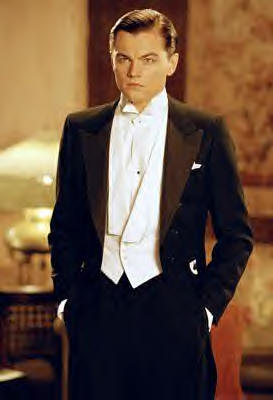
LEONARDO DiCAPRIO
FLYING HIGH
By Brad Balfour
Copyright ©2005
PopEntertainment.com.
All rights reserved. Posted: February 6, 2005.
Now that the now 30-year-old Leonardo DiCaprio has become a
superstar, having enjoyed the spotlight by
starring in the best-selling film of all time, Titanic,
he can have the luxury of obsessively pursuing his own dreams. One of
those dreams was to make a bio pic about millionaire eccentric Howard
Hughes, which he has now done, titled The Aviator,
helmed by legendary director Martin Scorsese and starring a bevy of
beauties from Gwen Stefani to Cate Blanchett. Being around such beauties is
something that the late Hughes and this former teen idol are both
known for. But while the late aviation innovator
and indie movie mogul descended into madness, DiCaprio has expanded his
career into producing and developing unique
properties such as this film.
You have established a rapport with Martin Scorsese since this is
the second time you've worked together.
What I'm going to say sound's like a cliché but I can't tell a lie. He is
every actor's dream to work with. He's the man in the business that you can
unanimously ask any actor of any age range, and they want to work with him
because he's not only one of the greatest filmmakers of all time, but he's
like a film historian. He's a professor of film. The man has seen almost
every film ever made up until 1980. You get an education while working with
him every single day. He screens movies for you to talk about specific
scenes and what he's trying to convey on the screen. You can ask him a
question about a character or the way a scene should go and he can show you
20 examples of filmmakers who have done it that way in the past, the way
it's been done right, the way it's been done wrong. It's an incredible
learning experience but in having this huge generational gap, we actually
found that we fundamentally share the same tastes in a lot of things, not
just film but music and art. And we dislike a lot of the same things as
well. We have a great work ethic together. We get along. We've had marathon
rehearsal sessions and sometimes those can be arduous if people don't enjoy
that process but his whole criteria, the thing that he does so well is he's
so persistent on making everything he does an authentic as possible. So, he
loves to have actors come to the table with an array of different
information and different new ideas and challenging things. He welcomes that
more than anyone else I've ever worked with. For this movie, and all the
research I did, we certainly did a lot of that.
What attracted you to Howard Hughes' life?
As an actor, you constantly search for that great character. Being a history
buff and learning about people in our past and amazing things
that they've done, I came across a book about Howard Hughes; he was
set up basically as the most multi-dimensional character I could ever come
across. Often, people have tried to define him in biographies. No one
seems to be able to categorize him. He was one of the most complicated men
of the last century. So I got this book, brought it to Michael Mann, and
John Logan came onboard and said "You can do 10
different movies about Howard Hughes. Let's focus on his younger years.
Let's watch his initial descent into madness but
meanwhile, have the backdrop of early Hollywood, these daring pioneers in
the world of aviation that were like astronauts that went out and risked
their lives to further the cause of aviation. [He was] the first American
billionaire who had all the resources in the world but was somehow unable to
find any sense of peace or happiness."
It's that great see-saw act that goes on in the movie. On one side, he's
having all the successes in the world and on the other side the tiny
microbes and germs are the things that are taking him downwards because of
his OCD and being a germaphobe.
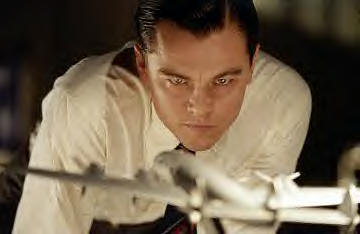 What other research did you do?
What other research did you do?
When the script landed on my lap, the real research began. After Marty and I
committed to the movie, it was a year of preparation. Not only did we have
marathon sessions with Logan and Scorsese but I got to meet a couple of
people who actually worked with Howard, who knew Howard. I drove up north to
spend a day with Jane Russell, and talk about Howard. Terry Moore, his
ex-wife, provided a lot of information about him. When you read a script and
it says in the script "He has obsessive-compulsive
disorder" and you read two pages of a man
repeating the same line over and over again, it's easy for a writer to write
because he has his own thought processes, but when you're an actor and
reading that, you say, ?How in the hell am I going to say this? What is the
driving force behind repeating something 20 times in a row and why the hell
is he doing it?? So that brought me to work with Dr. Jeffrey Schwartz of
UCLA who is the leading physician on obsessive-compulsive disorder and on
treating it in a non-medicated fashion. He really explained to me what OCD
is and the brain mechanism that goes into it. The
sort of sticky mental gearshift that happens when
your mind obsesses on one thing and you don't
listen to the other part of your brain that tells you you're being
ridiculous. So, I worked a lot with him and a patient of his. I spent a
few days living around him, talking to him and really trying to find
out why he had to repeat or do things obsessively. Then, reading
every possible book I could on Hughes and his life.
Did
you feel ever like you were losing it too doing an OCD breakdown scene?
Sometimes, definitely. You get into your own headspace and don't really want
to talk to anyone. I spent a lot of time just sitting around
in the s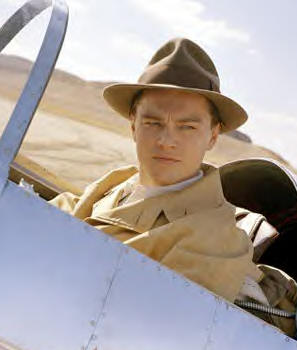 creening room alone. But, pain is temporary, film is forever,
and that's the fun part of knowing on the day that what you're doing
will actually show up on screen, that's the best feeling.
creening room alone. But, pain is temporary, film is forever,
and that's the fun part of knowing on the day that what you're doing
will actually show up on screen, that's the best feeling.
Would Hughes have been the genius he was without having OCD?
I think one is a direct result of one another. He would not have been as
obsessed about making the largest plane ever built. He wouldn't have been
obsessed about breaking every speed record or flying around the world faster
than anyone else. He wouldn't have been obsessed about re-shooting Hell's
Angels for sound, having that movie go on for four years. It was all a part
of his obsessive nature and his OCD made him have such an amazing,
astounding life. At the time, OCD was undiagnosed. People didn't know what
it was and he was such a private introverted person he wouldn't have had,
even if there was a doctor out there that could have cured him, that meeting
with the doctor to begin with, nor taken any medication to solve it. He just
thought it was his own essence, his own being, not knowing that he had any
kind of condition, and absolutely, it propelled him to do everything that he
did. I believe that. But also, he was a huge dreamer as well. It was a
crock-pot of different things that made Howard Hughes who he was, but OCD
was a huge part of it.
What do you think about a film telling the truth rather than
fictionalizing parts of a historical figure's life?
There's the later years of Howard's life which is a film in its own right
anyway. But the reason this film was made, the first true distinctive film
on Howard Hughes, and was possible because it focused on his younger years
and was being able to show not the growing up of this man during this time
period, but the state of our country and the kind of people that were around
in the beginning of early Hollywood and the attitudes of people who were
involved.
Do you draw a line between fact and fiction?
When it serves the film and the essence of what you're trying to portray,
and is the intention of the character, then [it's okay if you stretch the
truth.] There are a couple of things in this movie that weren't exactly what
really happened. I know there's all those detectives out there that love to
look for mistakes or things that weren't exactly the real deal. For example,
Howard Hughes never did the thing with buying the photos of Katharine
Hepburn and Spencer Tracy. The intention was the same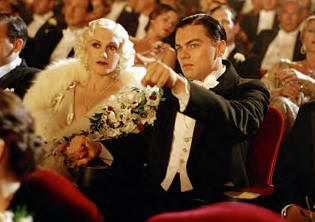 ,
he bought her The Philadelphia Story which she ended up doing on stage,
and inevitably got her an Academy Award after they broke up. The intention
was there. He still loved her, cared about her as a person, and did
something like that for her. As long as you're carried on the ride of the
film and you're engaged in the character. If it's
something that isn't way too far out in left field from what really happened,
I think it's the artists' right [to add
some interpretation].
,
he bought her The Philadelphia Story which she ended up doing on stage,
and inevitably got her an Academy Award after they broke up. The intention
was there. He still loved her, cared about her as a person, and did
something like that for her. As long as you're carried on the ride of the
film and you're engaged in the character. If it's
something that isn't way too far out in left field from what really happened,
I think it's the artists' right [to add
some interpretation].
What does this film say about or to society?
More than anything else, what I was worried about the most in this film was
saying, "Okay, here's the first American
billionaire. He's handsome, he sleeps with the
best women in the world, he's an American hero, so how the hell do you make
this situation with entrepreneur Juan Trippe and Pan American Airways and
this Senator become a sympathetic situation
towards Howard Hughes?" I was churning this
constantly through
my head and then realized, it has to do with corporate takeover and the
involvement of huge corporations with our government and how they're in
cahoots and it's [about what's] going on today with the Enron scandals and
numerous other things. That's what really made me say, "Okay,
here's this one man, he's his own boss, he's rich but he is a stand-up
individual" And here he is,
with all these horrible things going on with himself mentally
-- standing up in front of the Senate and battling the Senate to stop
the monopoly on international travel. I think, ultimately, people got behind
that and lost the other thoughts about who Howard Hughes was or whether he
would be a sympathetic character. As far as history is concerned, a lot of
people I spoke to said they really wanted Howard Hughes to be President
after that. They really loved this individual taking on the entire system,
the government, huge monopolies and corporations and that's what struck a
chord emotionally for people, or me, at least,
anyway.
What
about your Kates in the movie?
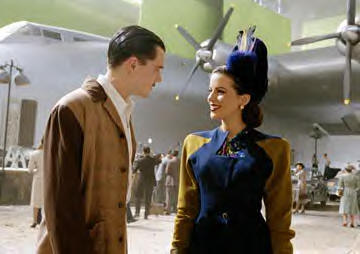 Well, for the Katharine Hepburn character there was really only one person
that could play that role in the world. There is the female version of
Daniel Day-Lewis, and that's Cate Blanchett. To be able to take on the
persona of one of the most iconic female voices of the 20th Century, one of
the most immediately recognizable voices, and being from Australia as well.
You have to be a true chameleon and genius. Enough said about that.
With Kate Beckinsale, we were looking for an Ava Gardner
and she came in with the full fur, Ava's attire,
make-up and attitude, so as soon as she stepped into the meeting, we
knew we had our Ava. She represented the class, had the strength, the
attitude. It was a joy to
work with both of them.
Well, for the Katharine Hepburn character there was really only one person
that could play that role in the world. There is the female version of
Daniel Day-Lewis, and that's Cate Blanchett. To be able to take on the
persona of one of the most iconic female voices of the 20th Century, one of
the most immediately recognizable voices, and being from Australia as well.
You have to be a true chameleon and genius. Enough said about that.
With Kate Beckinsale, we were looking for an Ava Gardner
and she came in with the full fur, Ava's attire,
make-up and attitude, so as soon as she stepped into the meeting, we
knew we had our Ava. She represented the class, had the strength, the
attitude. It was a joy to
work with both of them.
What are your film tastes?
LD: I'm still doing my homework, watching a lot of old movies. The last
thing I really got into was the whole neo-realism movement with
[Vittorio] De Sica The Bicycle
Thief and all of his great work, and those
great
Italian directors. It's so funny because here we are doing movies at
this day and age and you don't realize that these directors have
attempted these things almost 100 times before you. We think we're so
original with our ideas and what we're trying to accomplish, but some of
these great directors have gone to those extremes
and even further. That's why film preservation is
so damn important, so directors and actors can have a library of what people
did in the past and learn from it, trying to
improve, or not make the same mistakes.
Like Howard Hughes, do you think you'll have a place in history for
dating so many famous women?
That isn't my intention going into a relationship. But, it's an interesting
dynamic with Howard, because I honestly feel that as much as
he loved and adored these women and genuinely cared for them, he
looked at them like airplanes. He was a technical genius and obsessed with
finding the new, faster, bigger airplane and that was same with women. He
was constantly finding the new hotter female to go out with. It all related
back to him being orphaned at a very young age and having this empty hole in
his soul that, I think, was why he was always trying to fill his life with
new, more exciting things. Obviously, he ended up not a very happy person.
If he was thinking about whether, historically, he was going to become a
legend, I'm sure he had that sort of cat-and-mouse thing going on in his
mind where he wanted to be famous, but was more like, "look
at me! Look at me! No, don't look at me."
Email
us Let us know what you
think.
Features
Return to the features page
